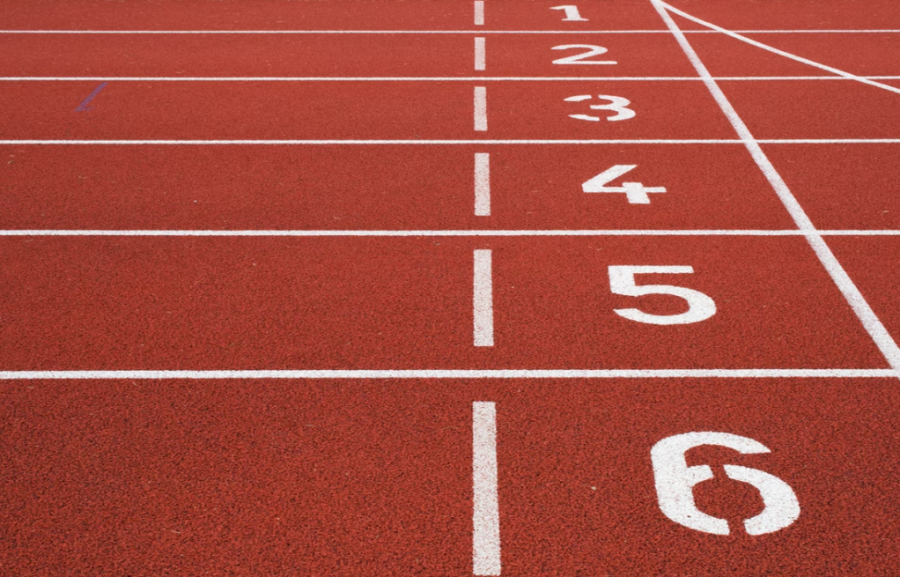Sports and Mental Health: CHS Perspective
According to a US News and World Report, more than 55% of students in the U.S. play a sport. The Center for Disease Control and Prevention (CDC) says that physical health and physical activity is directly related to brain health. For high school students, sports and physical activity are part of everyday life. This activity can influence the mind, significantly contributing to mental health, both positively and negatively.
Mr. Travis Igboin, “Iggy,” is the athletic trainer at Cinnaminson High School. As the trainer at CHS for over a year and an athlete himself, Iggy has experience with the impact sports can have on one’s well-being.
“If you play sports, you are doing something you love which can contribute to a positive mental aspect on mental health,” Iggy said. “However, if you’re just at home not doing anything, [becoming] miserable, you can become depressed and start having some issues with mental health.”
Physical activity, in general, is good for one’s well-being, and sports can sometimes serve as a distraction from outside issues. Not only do sports help keep one physically healthy, but they can also improve an individual’s mental health. Sports and physical activity cause your body to release endorphins, a chemical that your brain uses to relieve stress and pain.
Ms. Sara Skvir is the girls’ field hockey coach and a physical education teacher at CHS. She has a lot of experience balancing athletics with team building, making sure her athletes are confident and happy.
“I think it’s good for mental health. It helps get people’s minds off other things,” Skvir said.
Besides acting as a distraction, sports can allow people to make new friends and bond with other students. Sports can also allow athletes and students to meet new people and build relationships around shared interests.
“You are surrounding yourself with good people, you are surrounding yourself with friends,” Iggy said.
Mr. Brad Campbell, a history teacher and coach, agreed that sports can create a sense of belonging. Campbell has been a football coach for CHS in the past and is currently the boys’ head lacrosse coach. Campbell also teaches Human Behavior, which contributes to his knowledge about mental health.
“It gives them something to be a part of, something that’s bigger than themselves,” Campbell said about sports.
For some, sports can be disheartening when an athlete is not picked for a selective team. But, at CHS almost all sports offer different levels for each skill set so everyone can become involved. According to Campbell, this tiered athletics system provides a place for growth and improvement, fitting everyone’s different needs and desires.
“Many of our programs have a place for almost anybody who wants to be involved,” Campbell said.
Playing a sport also opens doors to new role models and guidance. Skvir said that athletes come to her hoping to receive advice and help with any concerns.
“I let my teams know, my athletes know, that I am here for them as a coach, as a counselor, as a teacher, as a mother,” Skvir said. “I want to be that whole role model for them, not just their coach, and I want them to be comfortable coming to me.”
Campbell says he has had conversations with athletes concerning anything from how to play a sport in college to personal problems like a divorce. He values the long-lasting relationships that these conversations can create.
“I think that’s one of the things that makes sports good for a kid’s mental health, they have extra grown-ups that are then on their side,” Campbell said.
Skvir also makes sure to incorporate fun team-building activities into practice to give her athletes a small break from “the grind.” These activities allow her athletes to escape the pressure and expectations that come with their sport.
“If I know I have a player that doesn’t handle stress well, I’m not gonna put them in a position that they have to make a lot of decisions, and I know they won’t be able to handle that stressful situation,” Skvir said.
Skvir says that in addition to individualizing training plans and including enjoyable team-building exercises, she takes mental health seriously and always tries to find the best plan to manage stress and get her athletes the help they need.
Unfortunately, sports can also damage mental health.
“When someone gets injured, you are taking away something they love, something they have been doing for most of their lives,” Iggy said.
Because sports can help mental health, taking them away can become difficult, especially for injuries when there is a loss of the sense of belonging that helps to boost mental health so much.
“That can definitely negatively impact your mental health, you can feel depressed, you can feel isolated, you can often feel sadness as a part of it, you just get a sense of a lack of belonging,” Iggy said. “Sometimes sports are some people’s identity, and they get their identities taken away from them.”
When Jalen Roberts, a senior, sprained his ankle his eighth-grade season of basketball, he experienced this lack of belonging and struggled with not being able to play with his best friends.
“I [felt] like I was useless…I felt like I was weak,” Roberts said.
In addition to season-ending injuries, some coaches do not provide a strong support system. These athletes can get caught up in comparison and lose some of the benefits that come with physical activities and team bonding.
Katherine Duong, who plays volleyball for multiple teams said coaches can impact performance and mental health.
“They are a pretty big part of your performance,” Duong said.
Comparisons from other athletes, teammates, parents, and coaches can also hurt mental health. According to the American College for Sports Medicine, approximately 30% of women and 25% of men who are student-athletes report having anxiety.
“When you don’t feel like you’re living up to that expectation, you can easily get depressed or you can fall into a stage where you just don’t feel like doing much at all,” Iggy said.
For Duong, comparison changes her mentality and her attitude towards the sport. But, Roberts doesn’t let comparison or pressure get in the way of his success.
“I know who I am at the end of the day, I know what I can bring to the table,” Roberts said, “but especially coaches and [other] players have to realize that everybody has a certain job.”
In many instances, athletes will find themselves absorbed in their personal lives, academic lives, and athletic lives, and have no time for themselves. They may constantly feel the pressure to perform and be as good as someone else, especially when college athletics are on the line.
Mr. Mike Repsher, a counselor at CHS, says that students can become very stressed by the college recruiting process. He advises students to make their own opportunities and look past the unknowns.
“In terms of the stress level, not knowing all those things can lead to a lot of anxiety,” Repsher said.
Repsher says most student-athletes find it hard to put themselves out there. There is some additional anxiousness that comes with not knowing if a coach is interested in you and putting yourself in an uncomfortable position.
“Looking at the full picture is super important,” Repsher said.
Athletics is just one of many factors in finding the perfect college and even in life in general. But, these stresses can also occur in college athletics even after the recruitment process is over. The American College of Sports Medicine reports that only 10% of all college athletes with known mental health conditions seek care from a mental health professional.
According to Repsher, many athletes get stuck into thinking: “Was I not good enough; were they better than me?”
When athletes fail to meet unrealistic expectations, it can damage their mentality and how they process expectations, comparisons, and goals. Unrealistic expectations can also become misleading and overall bad for an athlete. According to Repsher, finding a balance is key.
Repsher finds it helpful for athletes to focus their mental energy.
“The butterflies, the anxiousness before a game, all that stuff, how you process that in that moment is important,” Repsher said. “What I try to encourage people to think about now is that it’s your body’s way of telling you that you are about to do incredible things.”
Processing these feelings and directing your mental energy can allow you to perform your best and help boost mental health.
Iggy also said that reminding yourself of your individuality and successes is important in helping mental health and eliminating comparison.
“There is a saying,” Iggy said “you make a bad somebody else, but you make a great you. You are one of one.”








